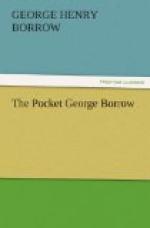So the bruisers of England are come to be present at the grand fight speedily coming off; there they are met in the precincts of the old town, near the Field of the Chapel, planted with tender saplings at the restoration of sporting Charles, which are now become venerable elms, as high as many a steeple; there they are met at a fitting rendezvous, where a retired coachman, with one leg, keeps an hotel and a bowling-green. I think I now see them upon the bowling-green, the men of renown, amidst hundreds of people with no renown at all, who gaze upon them with timid wonder. Fame, after all, is a glorious thing, though it lasts only for a day. There’s Cribb, the champion of England, and perhaps the best man in England; there he is, with his huge, massive figure, and face wonderfully like that of a lion. There is Belcher, the younger, not the mighty one, who is gone to his place, but the Teucer Belcher, the most scientific pugilist that ever entered a ring, only wanting strength to be, I won’t say what. He appears to walk before me now, as he did that evening, with his white hat, white greatcoat, thin, genteel figure, springy step, and keen, determined eye. Crosses him—what a contrast!—grim, savage Shelton, who has a civil word for nobody, and a hard blow for anybody—hard! one blow, given with the proper play of his athletic arm, will unsense a giant. Yonder individual, who strolls about with his hands behind him, supporting his brown coat lappets, undersized, and who looks anything but what he is, is the king of the light weights, so called,—Randall! the terrible Randall, who has Irish blood in his veins; not the better for that, nor the worse; and not far from him is his last antagonist, Ned Turner, who, though beaten by him, still thinks himself as good a man, in which he is, perhaps, right, for it was a near thing; and ‘a better shentleman,’ in which he is quite right, for he is a Welshman. But how shall I name them all? they were there by dozens, and all tremendous in their way. There was Bulldog Hudson and fearless Scroggins, who beat the conqueror of Sam the Jew. There was Black Richmond—no, he was not there, but I knew him well; he was the most dangerous of blacks, even with a broken thigh. There was Purcell, who could never conquer till all seemed over with him. There was—what! shall I name thee last? ay, why not? I believe that thou art the last of all that strong family still above the sod, where mayst thou long continue—true piece of English stuff, Tom of Bedford—sharp as winter, kind as spring.
Hail to thee, Tom of Bedford, or by whatever name it may please thee to be called, Spring or Winter. Hail to thee, six-foot Englishman of the brown eye, worthy to have carried a six-foot bow at Flodden, where England’s yeomen triumphed over Scotland’s king, his clans and chivalry. Hail to thee, last of England’s bruisers, after all the many victories which them hast achieved—true English victories, unbought by yellow gold; need I recount them? nay, nay! they are already well known to fame—sufficient to say that Bristol’s Bull and Ireland’s Champion were vanquished by thee, and one mightier still, gold itself, thou didst overcome; for gold itself strove in vain to deaden the power of thy arm; and thus thou didst proceed till men left off challenging thee, the unvanquishable, the incorruptible.




